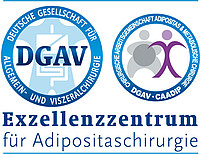You are here
Content
You have decided to have bariatric surgery and may be wondering how the preparation for surgery will take place or what the first few weeks after surgery will be like. Here, we answer some frequently asked questions.
Your recovery after surgery obviously depends on a number of factors, including the surgical procedure used. Our recommendations are based on years of experience in bariatric surgery at the University Hospital Mannheim.
Before surgery
Is bariatric surgery the easier solution?
The decision to undergo bariatric surgery is made by most patients after a long period of suffering. It is not the "easier" way compared to conservative weight loss attempts, but should be considered in cases in which conservative weight loss attempts have not been successful.
Those who decide to undergo bariatric surgery must be aware that this also means massive changes to their previous lifestyles.
What are the conditions required for bariatric surgery?
There is a medical guideline in Germany for the treatment of obesity using surgical procedures, which is summarized below:
BMI 35-39:
If one or more obesity-associated comorbidities are present (e.g., type 2 diabetes mellitus, congestive heart failure, obstructive sleep apnoea syndrome (OSAS), gastroesophageal reflux disease, asthma, etc.), bariatric surgery may be offered after individual evaluation by a physician when conservative therapy has been exhausted.
BMI ≥ 40:
If there are no concomitant diseases and/or no contraindications, after exhaustion of conservative therapy and following comprehensive education, the requirements for bariatric surgery are given.
What does Multimodal Concept mean?
The multimodal concept is used for the treatment of morbid obesity. According to German guidelines, in cases of morbid obesity (adiposity), multimodal treatment needs to be carried out before surgery can be considered and planned. This includes nutritional, exercise and behavioural therapy, as well as examinations by specialists such as endocrinologists and ENT physicians.
Of course, we will support you individually in the planning and in finding the right partners for the multimodal therapy.
How long does the multimodal concept take?
The multimodal concept usually extends over six months. If you lose enough weight during this time, surgery is of course not necessary.
Why is the multimodal concept so important?
The combination of different therapies is crucial for success, i.e. long-term weight loss. With nutrition, exercise and behavioural therapy being of central importance. Of course, we will support you individually in planning and in finding the right partners for the implementation of the multimodal therapy.
In what cases do I not have to complete the multimodal concept?
In individual cases, a primary indication for bariatric surgery may be made without a prior attempt at conservative therapy. The primary indication may be given when one of the following conditions exists and performing the multimodal concept is not possible or postponing surgery would worsen the patient's prognosis:
• In patients with a BMI ≥ 60
• In patients for which the multidisciplinary team has categorised an attempt at conservative therapy to be either unpromising or futile
• In patients with particularly severe concomitant and secondary diseases that do not allow postponement of surgical intervention
What if I cannot do an exercise program or physical activities?
If you are unable to perform an exercise program due to your illnesses, try to perform physiotherapy or rehabilitation sports according to your illness. The advantage: You will get professional help and an exercise program tailored to you.
If that is also not possible, you will need a statement from an orthopaedist as to why it is not possible in your case.
Do I have to attend a self-help group?
Not everyone wants to join a self-help group. That's perfectly fine.
Nevertheless, self-help forums (online), for example, offer a good opportunity to exchange ideas with other sufferers - completely anonymously. You are welcome to contact an obesity self-help group and ask your questions. We will be happy to help you find a self-help group near you.
In what cases will my (German) health insurance pay for the surgery?
After your presentation at our bariatric centre, you will start with the so-called multimodal concept, which spans over a period of at least six months. If you meet the conditions for bariatric surgery according to valid guidelines, you can have the surgery performed at our centre without prior review by your (German) health insurance. After the surgery, we will submit the bill to your health insurance as we would do with any other inpatient treatment.
Who decides on the right treatment in my case?
All decisions regarding your treatment are taken together with you. As a treatment team, we make recommendations to you for the optimal treatment/therapy. In addition, we confer as a treatment team in regularly scheduled case conferences to adjust or continue treatment.
Ultimately, you are the person who decides whether to pursue treatment according to our recommendations.
Will the protein shakes in the 2-week liquid phase in preparation for the surgery be covered by health insurance?
No, these shakes are considered food items and are therefore not covered by health insurance.
What if I lose my patient folder?
It can be very painstaking to replace lost records. In some cases, you may face high costs if your doctors and practitioners have to reissue records for you.
Tip: Make at least one copy of all documents. These can also be electronic - as a photo or PDF on your PC/tablet/mobile phone. Of course, you can also file them in paper form with your health records.
Physical activities after surgery
How long do I have to stay in inpatient treatment after the operation?
Depending on their condition, our patients stay inpatient for about 1-3 days.
When can I return to work?
That depends very much on the physical strain at your work. Talk to your surgeon. You should refrain from lifting weights over 5 kg for a period of 4-5 weeks if the operation was performed laparoscopically (keyhole surgery). After open surgery, the period should be at least 6 weeks.
When can I start doing sports again?
After about a week, you can usually take walks of up to 30 minutes. After that, you can slowly increase the activity and after 4-6 weeks all kinds of sports can be done. If you still experience discomfort or activities lead to discomfort, reduce the effort again.
How long should I refrain from exercising with weights or do sit-ups?
You should wait 4-6 weeks after the surgery before lifting heavier weights. The same applies to sit-ups.
When can I start driving again?
As soon as you feel fit enough, you can drive again as long as you are not taking any strong painkillers.
When can I have sex again?
Generally about one week after discharge from the hospital. However, this always depends on how you feel. Be careful with yourself and, if necessary, follow the recommendations that generally apply to physical activities (e.g., do not lift weights of more than 5 kg).
When can I take a shower, bath or swim again?
Showering is possible on the second day after the operation. You should wait a total of 10 days before taking a bath, and you should refrain from swimming or visiting swimming pools for about four weeks.
Will I need an abdominal reduction surgery later?
This varies from person to person. It depends, among other things, on your age and how much weight you will lose. Also, the demands on personal appearance are very different.
Pain, nausea and wound healing after bariatric surgery
Will I experience pain after surgery?
During the first 24 hours, you may experience pain in the shoulder and chest region. This has to do with the gas used during surgery. The surgical wounds may also feel uncomfortable at first. Good and generally adequate pain medication is always given. The goal is to get you back on your feet as soon as possible. Pain medication needs are very individual, so you can always talk to us if you are in pain.
Many patients describe the feeling on their abdominal wall after surgery like sore muscles or a muscle cramp. If you experience severe pain after the operation, please inform us or present yourself in our emergency room, if you are already at home.
How much pain is normal?
Tolerance for pain varies greatly. Therefore, it is not possible to give a blanket answer to this question. However, if you are experiencing severe pain, we strongly recommend that you contact us and present yourself in our emergency room.
Will the wounds bleed or ooze?
Some bleeding or oozing of the wounds is normal and you may need to change the wound plasters several times. This is generally over after two days. If the wounds are still producing fluid or are very red after seven days, please contact us.
What should I do if I feel nauseous and vomit after discharge?
Mild nausea after surgery is relatively common. There are medications for this that your general practitioner can prescribe. In case of repeated occurrence, you should contact the operating clinic again.
Can anything break if I throw up after the operation?
That is very unlikely. If you experience a lot of nausea after surgery, present to your primary care physician or bariatric consultation. You may need to take an anti-nausea medication to prevent this.
Should I remove wound plasters for showering?
Wound plasters should not be removed for showering at first. Showering is fine two days after surgery. Special shower plasters are not necessary. If any plasters are still needed, they should be changed after showering. After 2-3 days, wounds that do not ooze or bleed no longer need a wound plasters.
Should I expect swelling or bruising?
Slight swelling, especially around the wounds, is normal. Slight bruising around the wounds is also not uncommon and usually not a problem. If you are unsure whether the amount of swelling or bruising is normal for you, or if there is a lot of redness around the wound, you should contact the clinic again.
Can I support wound healing with special plasters or ointments?
No. Only in special cases (allergy or wound infection), special plasters or an antiseptic ointment can be useful. Usually, the skin heals best on its own.
Complications after bariatric surgery
When should I present to the hospital?
If you are at home and experience a fever, pain, or red and overheated sores, go to the hospital.
What can happen to the sleeve gastrectomy or gastric pouch if I consume solid foods too soon?
Please follow the dietary recommendations you received before and after surgery. If you have any questions, please contact us. If you eat solid food too soon, you may experience vomiting and severe pain. Damage to the operated stomach can also occur in such cases.
What should I do if one of the wounds becomes infected?
If you think you have an infection in the area of one of the wounds, visit to your primary care physician or a hospital immediately. Treated in a timely manner, major problems can be avoided.
What can I do to quickly reach someone qualified in an emergency?
If you are unsure and need telephone support, please call 0621/383-2209.
If you need help outside of consultation hours, please contact our emergency outpatient clinic, which you can reach at 0621/383-2197.
Further questions
Can hair loss occur after the surgery?
Yes, in individual cases patients experience hair loss for a few weeks to months after the surgery. However, this regulates itself over time. Zinc preparations can be taken as a preventive measure. However, since hair loss can have various causes (protein deficiency, zinc deficiency, hormonal changes, etc.), there is unfortunately no universal remedy.
When can I get pregnant after bariatric surgery?
We strongly recommend waiting about 1.5 to 2 years after surgery before becoming pregnant. This minimizes the risks for you and your unborn child. However, if you do become pregnant directly after the operation, we strongly recommend that you have a close check-up at our clinic, as we work together with experienced gynaecologists in such cases.
How much weight will I lose?
This varies from person to person and depends, among other things, on your cooperation (exercise, meals, portion sizes, calorie intake). On average, you will lose about 70% of your excess weight.
What should I do if I am invited to dinner?
If you want, inform your host to prepare a smaller food portion for you. You have the possibility to get an attestation from us, which states that you underwent a stomach reduction surgery in our clinic. You can present this attestation not only in case of emergency, but also when you visit a restaurant, so that you can order smaller portions or children's portions if necessary.
Medications after bariatric surgery
What medications should be avoided after surgery?
Substances known to damage the gastric mucosa, so-called "non-steroidal anti-inflammatory drugs", such as ibuprofen and diclofenac, aspirin, codeine-containing drugs, alcohol and cigarette smoke. These medications or substances should be avoided. Ask your primary care physician or pharmacist in case of uncertainty.
What about vitamins?
We recommend taking vitamin supplements (e.g. fitforme) specifically offered the support the recovery from bariatric surgery. These are better balanced and adapted than vitamin preparations from the supermarket. Talk to your bariatric centre.
Will the vitamins I have to take every day after surgery be covered by health insurance?
No, these must be paid for by you and are not reimbursable.
Context Column
Consultation hours and appointments
Phone +49 (0)621/383-2209
(Video consultation possible)
The obesity clinic team


Dr. med. Georgi Vassilev
Deputy Head of the Rhine Neckar Obesity Centre
Coordinator of the Colon Cancer Centre
Chief Physician of the Surgical Clinic


